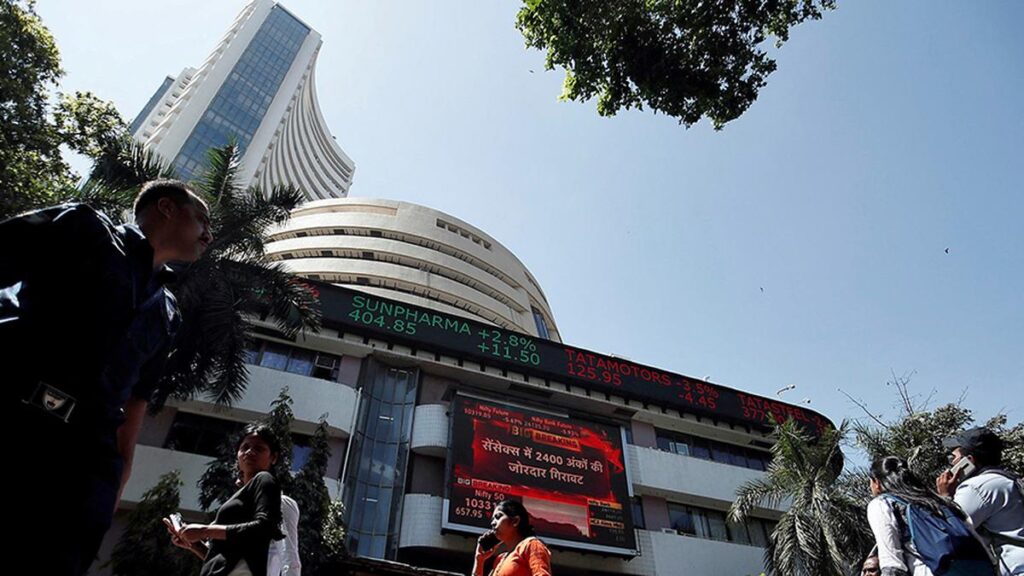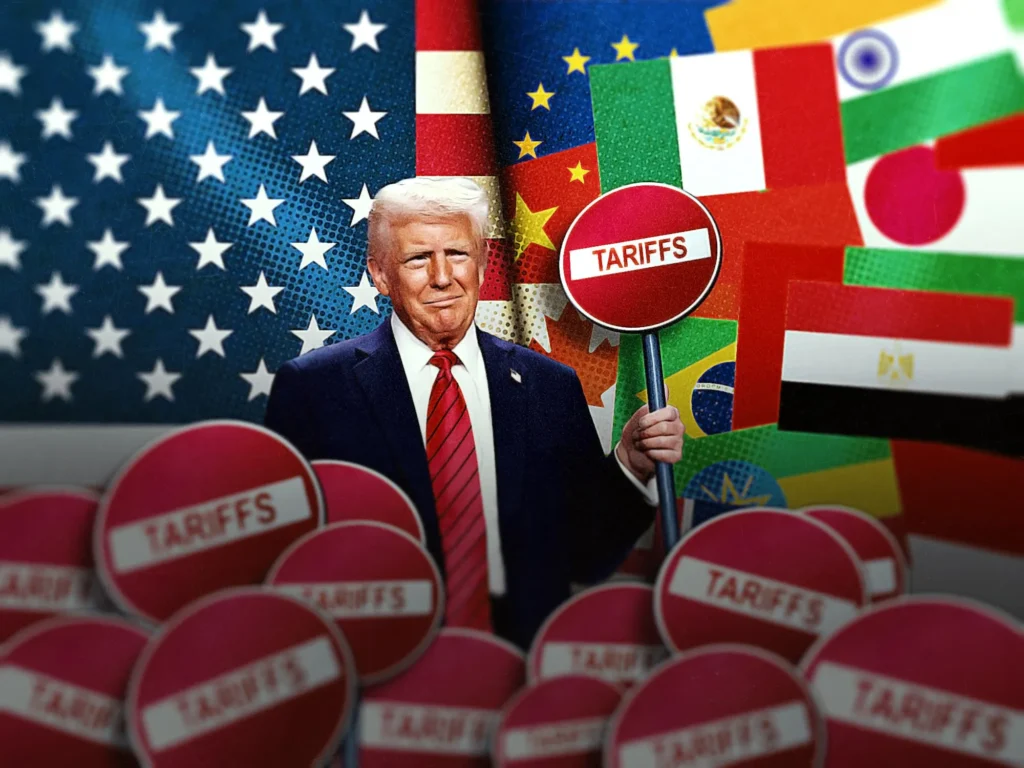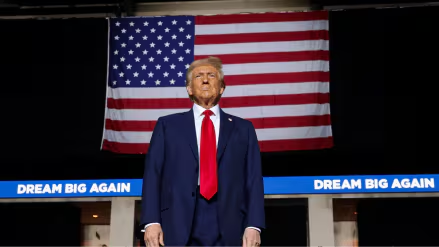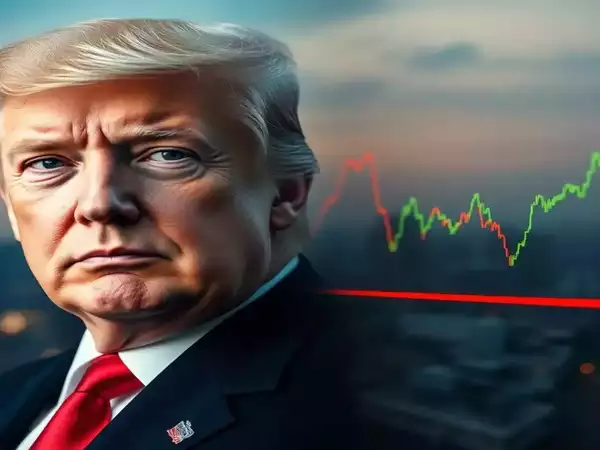The global financial markets are witnessing significant turmoil as a result of the ongoing trade wars initiated under former U.S. President Donald Trump’s administration. The imposition of hefty tariffs on various goods from China, Europe, and other trading partners has led to a cascade of economic disruptions. Investors, already wary of volatile market conditions, have been rattled by the unpredictability of trade relations, causing sharp sell-offs across stock exchanges worldwide. The Indian stock market, particularly the Nifty index, is not immune to these global developments, and experts predict that the Nifty may continue to see downward pressure in the coming weeks.
The Impact of Trump’s Tariffs on Global Markets
Donald Trump’s decision to introduce tariffs on imported goods was part of a broader “America First” economic policy. While the goal was to reduce the U.S. trade deficit and encourage American manufacturing, the unintended consequences of these tariffs have had far-reaching effects on global markets. Countries like China, the European Union, and Canada retaliated with their own tariffs, creating a cycle of trade barriers that disrupted supply chains, raised costs for businesses, and undermined consumer confidence. This escalation has created a sense of instability, making investors hesitant and driving down stock prices globally.
The volatility sparked by Trump’s tariffs has reverberated through every sector, particularly those dependent on global trade, such as technology, automobiles, and agriculture. The trade dispute between the U.S. and China, two of the world’s largest economies, has been one of the most impactful. As China is a major exporter of goods, tariffs on Chinese products have resulted in higher costs for U.S. companies and consumers, leading to reduced profits for many multinational corporations. Meanwhile, the Chinese economy has also been affected by U.S. tariffs, causing ripple effects throughout emerging markets.
The Ripple Effect on Emerging Markets and the Nifty
Emerging markets, including India, have not been spared from the aftershocks of this global trade conflict. The Indian stock market, as represented by the Nifty index, has been under significant strain. The Nifty, a benchmark index for the National Stock Exchange (NSE) of India, has seen substantial fluctuations, and many analysts believe it could face further declines as global uncertainties continue.
The Nifty’s performance is closely tied to global sentiment, and the negative impact of the U.S.-China trade war, along with the economic fallout from Trump’s tariffs, has triggered a cautious stance among foreign investors. Foreign institutional investors (FIIs), who are significant players in the Indian stock market, have pulled back from the Indian equity markets, leading to a sharp dip in the Nifty and other indices.
Moreover, the Indian economy itself faces challenges. The depreciation of the Indian rupee, a consequence of the trade tensions, has made imports more expensive, contributing to inflationary pressures. This has hurt domestic companies reliant on imported raw materials and components. The rising cost of production and potential slowdown in global demand could further exacerbate the situation, leading to a bearish sentiment among Indian market participants.
Global and Domestic Factors Driving the Downward Trend
Apart from the trade wars, there are several other factors contributing to the downward trajectory of global markets and the Nifty. Domestically, India is grappling with slow economic growth, rising unemployment, and weak consumer demand. These factors are compounding the challenges created by external pressures, such as tariffs and the slowing global economy.
In the U.S., although the Trump administration argued that the tariffs would benefit American workers by protecting local industries, the reality has been more complex. As tariffs continue to affect global supply chains, businesses worldwide are facing higher input costs, which is hurting profitability. Additionally, companies are finding it difficult to adjust to the new tariff landscape, and uncertainty remains about how long these trade tensions will last. This ongoing uncertainty has caused global investors to become more risk-averse, leading to market sell-offs.



The Outlook for the Nifty: Bearish Sentiment
Given the current global and domestic conditions, experts predict that the Nifty may continue to experience downward pressure in the near future. Although Indian markets had seen some recovery post-pandemic, the fresh challenges posed by global trade tensions, coupled with domestic economic concerns, are likely to result in further declines.
One of the most significant factors weighing on the Nifty’s performance is the outflow of foreign investment, which has been triggered by global economic uncertainty. In addition, the Indian government’s inability to address structural economic issues, such as unemployment and sluggish industrial growth, could continue to undermine investor confidence.
Conclusion: A Long Road Ahead
The economic fallout from Trump’s tariffs has led to a global market meltdown, and the Nifty is no exception to this trend. As trade wars continue to disrupt global supply chains, and economic uncertainty remains high, Indian markets are likely to see further volatility. While the long-term outlook for the global economy and Indian markets remains uncertain, it is clear that the immediate future holds challenges. For investors, staying informed about global trends and diversifying portfolios will be crucial in navigating these turbulent times. As the situation evolves, it is essential for market participants to remain vigilant and adapt to the changing landscape to mitigate potential risks.
FOLLOW:https://newsroom47.com/cognizant-postpones-salary-hikes/
Newsroom 47
